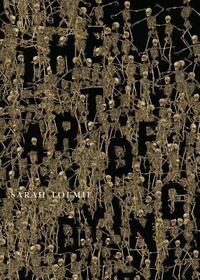Take a photo of a barcode or cover
The art (in/)of dying. Modern poetry that is immediately accessible. The theme expressed through a myriad of different poems. Rhyming was a little annoying, but that is a purely personal issue. Some of the poems felt abrupt but this didn't dissuade from the quality of the poems. I enjoyed this collection but it did feel a little scrambled at times, which is why I consider this one only okay.
I think it's ambitious and dangerous for a poet to write an entire book of poems about death. I think picking a topic like that could leave a writer open to sounding pretentious and trite, as death is not something easily written about without either saying what's already been said or coming off as a bit of a self-important know-it-all.
Unfortunately, this book did just that in my opinion. I will give it points for making me feel things, which is what poetry is supposed to do. However, what I felt was annoyed. Some of the structure and rhyme schemes of the poems themselves were genuinely very good, SO I can't bee too hard on the quality of the work in that respect. However, the views of the poet and the points being made just got to be repetitive after a while. Not a single gut-punch, heart-drop moment, which for me is how I knows that poetry is really good and special. Like I said, it inspired a reaction, but it wasn't a very pleasant one and not one I'd want to repeat.
Unfortunately, this book did just that in my opinion. I will give it points for making me feel things, which is what poetry is supposed to do. However, what I felt was annoyed. Some of the structure and rhyme schemes of the poems themselves were genuinely very good, SO I can't bee too hard on the quality of the work in that respect. However, the views of the poet and the points being made just got to be repetitive after a while. Not a single gut-punch, heart-drop moment, which for me is how I knows that poetry is really good and special. Like I said, it inspired a reaction, but it wasn't a very pleasant one and not one I'd want to repeat.
emotional
reflective
slow-paced
dark
fast-paced
I was so intrigued by the concept of this poetry collection, and the cover is pretty cool, so I definitely was hoping for the best when I went into this. I ended up... not exactly loving it?
Some of the poems or individual lines felt beautiful and profound. Some of the poems and individual lines were darkly funny. Unfortunately, most of the poems were really not to my taste. The political and pop culture references often felt very out of date despite the collection only being released maybe a year and a half ago. Some of the opinions about politics, activism, social media, etc felt like they belonged to a generation or two older than me. A lot of it just made me cringe. The form isn't bad, but I wouldn't say it's to my taste either.
Overall, I wouldn't go out of my way to recommend this, but I wouldn't necessarily recommend against it either since I'm sure a lot of it is differences in taste. I didn't hate it, but I didn't like it either.
Some of the poems or individual lines felt beautiful and profound. Some of the poems and individual lines were darkly funny. Unfortunately, most of the poems were really not to my taste. The political and pop culture references often felt very out of date despite the collection only being released maybe a year and a half ago. Some of the opinions about politics, activism, social media, etc felt like they belonged to a generation or two older than me. A lot of it just made me cringe. The form isn't bad, but I wouldn't say it's to my taste either.
Overall, I wouldn't go out of my way to recommend this, but I wouldn't necessarily recommend against it either since I'm sure a lot of it is differences in taste. I didn't hate it, but I didn't like it either.
Sarah Tolmie came to my high school and read some poems from this book. I remember we weren't sure what to think of at first but by the end we had all fallen in love with this dark yet humourous poetry.
fast-paced
The art (in/)of dying. Modern poetry that is immediately accessible. The theme expressed through a myriad of different poems. Rhyming was a little annoying, but that is a purely personal issue. Some of the poems felt abrupt but this didn't dissuade from the quality of the poems. I enjoyed this collection but it did feel a little scrambled at times, which is why I consider this one only okay.
This was dark and funny. A good reintroduction of poetry for me. It took a heavy topic and left me feeling hopeful instead of dejected.





